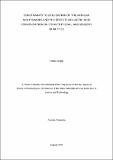| dc.description.abstract | African nightshades (ANS, Solanum nigrum complex) are among the most widely distributed
and consumed indigenous vegetables in Tanzania. Several challenges hamper the utilization of
ANS. This study sought to assess trends and constraints to ANS utilization in Kilimanjaro and
Morogoro regions, Tanzania and also, to assess the effect of lactic acid fermentation on the
nutritional and sensory quality of ANS. About 627 farmers' households were involved in the
study. Quantitative and qualitative methods were employed to collect information. Semi structured questionnaires, focus group discussions and Key informants’ interviews were the
methods of data collection. Solanum villosum and Solanum scabrum were fermented naturally
and controlled fermentation using Lactobacillus plantarum and Leuconostoc mesenteroides.
The results showed that ANS is mainly used as food (96.1%), animal feed (41.3%), and
medicine (38%). On average, only 5% of ANS sales contributed to family income. The main
constraints to ANS utilization include; pests and diseases (92.9%), lack of knowledge (58%),
shortages of fertilizer (51%), shortages of pesticides (50%), inadequate means of transport
(50.4%), lack of extension services (48%), improper postharvest handling (41.4%) and
inadequate storage facilities (34%). Postharvest losses accounted for a 78.4% loss of ANS.
There was minimal value addition on ANS, e.g., drying (5.3%) and fermentation (1.1%).
Fermentation significantly reduced pH and increased titratable acidity. Fermentation increased
β-carotene 2-5 times for both pickles. Vitamin C, chlorophyll and polyphenol were
significantly reduced. Fermentation increased bioavailability of minerals (P, Ca, Fe and Zn).
Knowledge should be given on good agricultural practices i.e., the proper use of pesticides,
fertilizers, and quality seeds. Knowledge of the processing and preservation of ANS is
necessary for farmers to improve utilization, reduce losses and ensure ANS availability.
Fermentation can preserve ANS, with an increase in β-carotene and reducing antinutrients.
Fermentation can be recommended to small-scale farmers, processors and households to
improve their nutrition and livelihood. | en_US |

